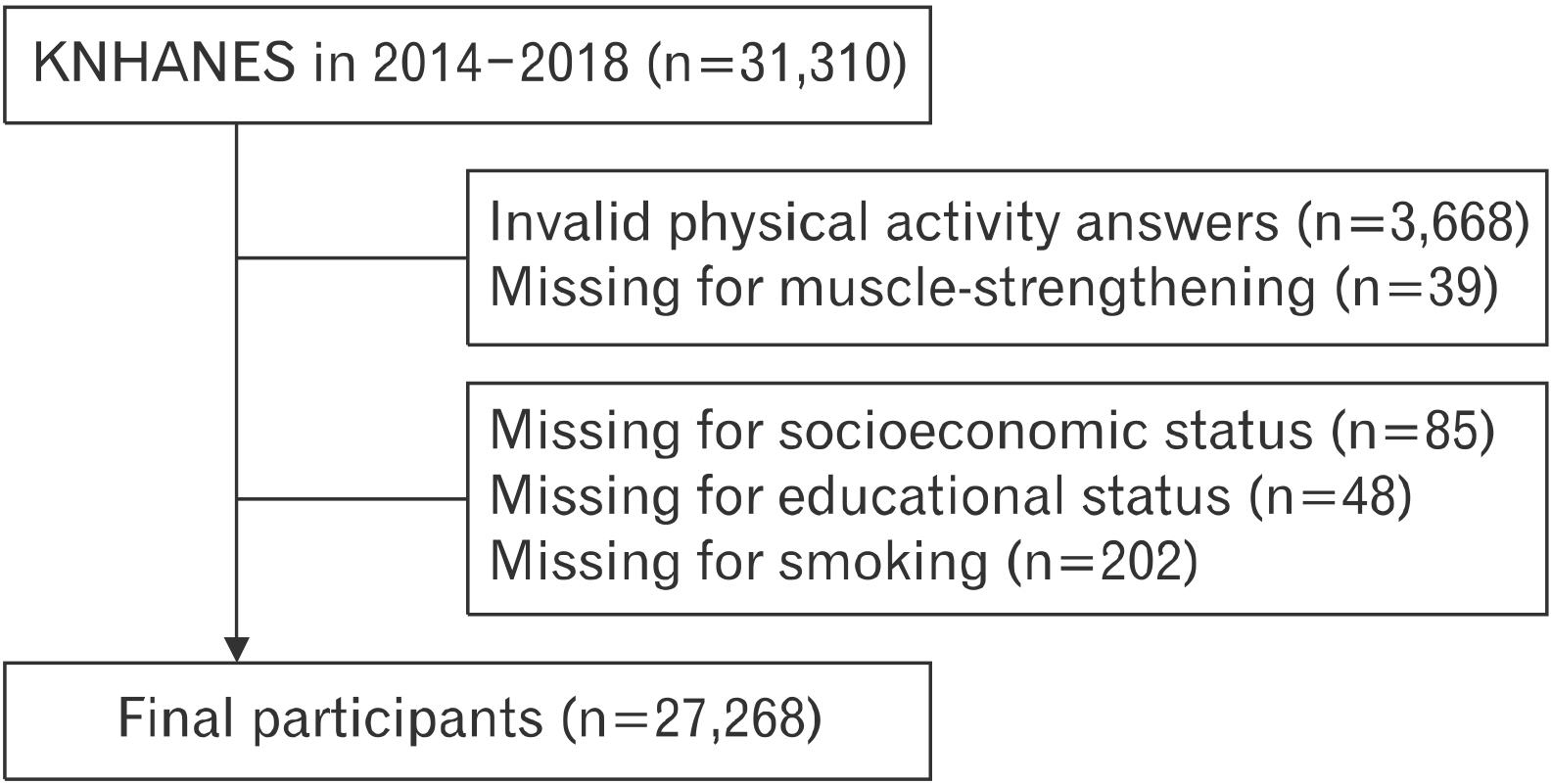Korean J Sports Med.
2021 Dec;39(4):181-187. 10.5763/kjsm.2021.39.4.181.
Association between Physical Activity Types and Mental Health in Korean Adults: Korea National Health and Nutrition Examination Survey, 2014–2018
- Affiliations
-
- 1Department of Physical Education, College of Education, Seoul National University, Seoul, Korea
- 2Institute of Sport Science, Seoul National University, Seoul, Korea
- KMID: 2523233
- DOI: http://doi.org/10.5763/kjsm.2021.39.4.181
Abstract
- Purpose
The purpose of this study was to examine the associations of aerobic physical activity and musclestrengthening exercise with mental health, respectively. Furthermore, the relationship between combined exercise with depression, stress, and suicidal thoughts was also examined.
Methods
The association between adherence to physical activity guidelines and mental health was analyzed among 27,268 adults who participated in the 2014– 2018 Korea National Health and Nutrition Examination Survey. Logistic regression was used to predict the relationship between adherence to physical activity guidelines and mental health.
Results
The odds ratio for depression and suicidal thoughts in groups that met both aerobic physical activity and muscle-strengthening exercise guidelines decreased by 27% (95% confidence interval [CI], 0.56– 0.94) and 40% (95% CI, 0.39– 0.93), respectively, compared to those that did not meet both. Stress awareness decreased by 22% (95% CI, 0.67– 0.90) in those who met muscular exercise guidelines, but did not meet aerobic physical activity guidelines. For those who met only the aerobic physical activity guidelines, stress awareness decreased by 12% (95% CI, 0.82 – 0.95). In addition, the odds ratio decreased by 29% (95% CI, 0.62 – 0.80) in groups that met both guidelines.
Conclusion
The most positive relationships between adherence to physical activity guidelines and mental health were found when both aerobic and muscular exercise guidelines were met.
Figure
Reference
-
1. Stanton R, To QG, Khalesi S, et al. 2020; Depression, anxiety and stress during COVID-19: associations with changes in physical activity, sleep, tobacco and alcohol use in Australian adults. Int J Environ Res Public Health. 17:4065. DOI: 10.3390/ijerph17114065. PMID: 32517294. PMCID: PMC7312903.
Article2. OECD Health Statistics. 2021. Suicide rates (indicator) [Internet]. OECD;Paris: Available from: https://data.oecd.org/healthstat/suicide-rates.htm. cited 2020 Mar 21.3. Bueno-Notivol J, Gracia-García P, Olaya B, Lasheras I, López-Antón R, Santabárbara J. 2021; Prevalence of depression during the COVID-19 outbreak: a meta-analysis of community-based studies. Int J Clin Health Psychol. 21:100196. DOI: 10.1016/j.ijchp.2020.07.007. PMID: 32904715. PMCID: PMC7458054.
Article4. Lee E. 2020; COVID 19 generation, how is your mental health! Issue Diagn. (414):1–25.5. Bartley CA, Hay M, Bloch MH. 2013; Meta-analysis: aerobic exercise for the treatment of anxiety disorders. Prog Neuropsychopharmacol Biol Psychiatry. 45:34–9. DOI: 10.1016/j.pnpbp.2013.04.016. PMID: 23643675.
Article6. Morres ID, Hatzigeorgiadis A, Stathi A, et al. 2019; Aerobic exercise for adult patients with major depressive disorder in mental health services: a systematic review and meta-analysis. Depress Anxiety. 36:39–53. DOI: 10.1002/da.22842. PMID: 30334597.
Article7. 2018 Physical Activity Guidelines Advisory Committee. 2018. 2018 Physical Activity Guidelines Advisory Committee scientific report [Internet]. U.S. Department of Health and Human Services;Available from: https://health.gov/sites/default/files/2019-09/PAG_Advisory_Committee_Report.pdf. cited 2020 Apr 15. Washington, DC:8. Paluska SA, Schwenk TL. 2000; Physical activity and mental health: current concepts. Sports Med. 29:167–80. DOI: 10.2165/00007256-200029030-00003. PMID: 10739267.9. Babyak M, Blumenthal JA, Herman S, et al. 2000; Exercise treatment for major depression: maintenance of therapeutic benefit at 10 months. Psychosom Med. 62:633–8. DOI: 10.1097/00006842-200009000-00006. PMID: 11020092.
Article10. O'Connor PJ, Herring MP, Caravalho A. 2010; Mental health benefits of strength training in adults. Am J Lifestyle Med. 4:377–96. DOI: 10.1177/1559827610368771.11. Adams TB, Moore MT, Dye J. 2007; The relationship between physical activity and mental health in a national sample of college females. Women Health. 45:69–85. DOI: 10.1300/J013v45n01_05. PMID: 17613463.
Article12. Bennie JA, Teychenne MJ, De Cocker K, Biddle S. 2019; Associations between aerobic and muscle-strengthening exercise with depressive symptom severity among 17,839 U.S. adults. Prev Med. 121:121–7. DOI: 10.1016/j.ypmed.2019.02.022. PMID: 30786252.
Article13. World Health Organization (WHO). 2018. Mental health atlas 2017. Country Profiles [Internet]. WHO;Geneva: https://www.who.int/publications/i/item/9789241514019. cited 2020 May 7.14. Kroenke K, Spitzer RL, Williams JB. 2001; The PHQ-9: validity of a brief depression severity measure. J Gen Intern Med. 16:606–13. DOI: 10.1046/j.1525-1497.2001.016009606.x. PMID: 11556941. PMCID: PMC1495268.15. Sillanpää E, Häkkinen K, Holviala J, Häkkinen A. 2012; Combined strength and endurance training improves health-related quality of life in healthy middle-aged and older adults. Int J Sports Med. 33:981–6. DOI: 10.1055/s-0032-1311589. PMID: 22782386.
Article16. Gordon BR, McDowell CP, Hallgren M, Meyer JD, Lyons M, Herring MP. 2018; Association of efficacy of resistance exercise training with depressive symptoms: meta-analysis and meta- regression analysis of randomized clinical trials. JAMA Psychiatry. 75:566–76. DOI: 10.1001/jamapsychiatry.2018.0572. PMID: 29800984. PMCID: PMC6137526.17. Heo J. 2019; Association between physical activity and perceived stress among Korean adults: a cross-sectional study using 2017 the Korea National Health and Nutrition Examination Survey Data. Stress. 27:313–9. DOI: 10.17547/kjsr.2019.27.4.313.
Article18. Gordon BR, McDowell CP, Lyons M, Herring MP. 2017; The effects of resistance exercise training on anxiety: a meta- analysis and meta-regression analysis of randomized controlled trials. Sports Med. 47:2521–32. DOI: 10.1007/s40279-017-0769-0. PMID: 28819746.19. Park S. 2014; Associations with physical activity, chronic disease, depression, and health-related quality of life. Korean J Sport Sci. 25:249–58. DOI: 10.24985/kjss.2014.25.2.249.
- Full Text Links
- Actions
-
Cited
- CITED
-
- Close
- Share
- Similar articles
-
- Differences in Physical Activity According to Age and Depression: Based on the 2014-2017 Korea National Health and Nutrition Examination Survey
- The Association between Resistance Exercise Frequency, Aerobic Physical Activity Level, and Health-Related Quality of Life in Korean Older Adults: Findings from the Seventh Korea National Health and Nutrition Examination Survey, 2018
- Current Status of Physical Activity According to the Socioeconomic Status of Korean Adults: Based on the Korea National Health and Nutrition Examination Survey 2014‒2018
- The Study of Dietary Habits and Health Behaviors according to Physical Activity Type in Korean Adults -Based on the 2016~2018 Korea National Health and Nutrition Examination Survey-
- Factors Affecting the Improvement of Adult Atopic Dermatitis in Their 20s and 30s: The Seventh Korean National Health and Nutrition Examination Survey, 2016–2018


